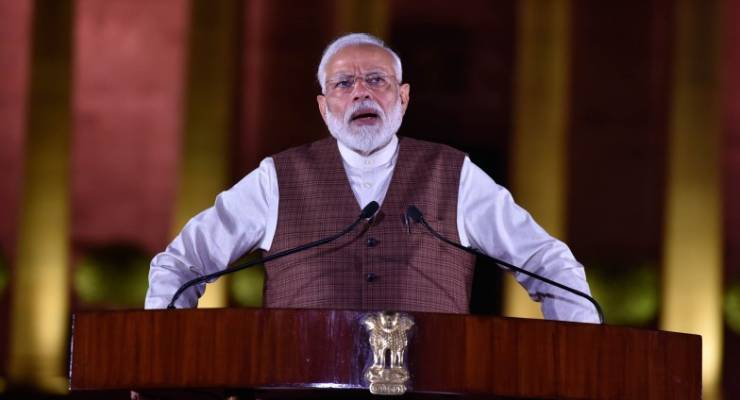
The world has dramatically changed since Scott Morrison and India’s Prime Minister Narendra Modi were last meant to catch up.
That was in January. Six months and one pandemic later, the meeting finally took place earlier in June — virtually, of course. But the real change was what didn’t get a mention: coal.
Much like iron ore to China, coal is the centrepiece of Australia’s India exports. Of $21.1 billion in exports to India in 2018, $10.9 billion was coal. Australia’s fossil fuel trade with India would have come in an unwelcome light for Morrison at this time.
Instead, the leaders largely focused on defence, maritime interests, science and technology co-operations, and health issues. The latter included COVID-19, of course, but also India taking over the rotating chair of the World Health Organisation. While China was never directly mentioned, the meeting was, well, all about China.
India’s increasing and flagrant, government-backed human rights abuses were also understandably off the agenda.
Our love affair with India
Australia’s romancing of India has stepped up recently. In December, Defence secretary Greg Moriarty and Department of Foreign Affairs and Trade secretary Frances Adamson visited New Delhi for so-called “2+2 talks”. An official invitation to join the annual Malabar exercises with the US and Japan is now on the way.
This will finally see the active engagement of the so-called “Quadrilateral Security Dialogue” between the four countries in active engagement. It’s a move that is sure to infuriate Beijing which sees the alliance as a key plank in the US and its allies’ project of containment. While this is constantly denied by all involved, it is patently true. India’s recent border tensions with China has helped Canberra’s cause in drawing Delhi strategically closer.
While China was the obvious elephant in the room, coal was the other. It is now exactly 12 months since Adani’s controversial Queensland coal project was given the green light by the Queensland Labor government. Gina Rinehart and Clive Palmer, among others, are also planning giant India-focused coal projects.
India has moved into the select top group of international relationships for Australia, and a huge amount of diplomatic effort and government money is being poured into upgrading Australia’s diplomatic and trade infrastructure with the country.
India is already Australia’s fifth largest trading partner and will move to number three within a couple of years.
But the relationship with India is already imbalanced, with Australia’s exports to India more than 300% of India’s exports here. The two countries have been in fruitless talks for the past nine years.
India supplies the second-largest cohort of students to Australia’s education market, and is the seventh-largest supplier of tourists. But India’s rising COVID-19 crisis will cruel these numbers, perhaps drastically.
And while it’s true that India’s political system is closer to Australia’s than China’s is, all democracies are not made equal. Many are not as open, and some, such as India’s, are systemically corrupt.
Turning a blind eye to atrocities
It is in the denial of human rights and effective sanctioning of sectarian discrimination and violence that India is failing, under Narendra Modi’s Hindu nationalist Bharatiya Janata Party (BJP).
Now in its sixth year with another four to run, the BJP government has plumbed new and disturbing depths with its backing of so-called radical adherents to the Hindutva ideology. Hindutva is framed as religiously diverse, although is majority Hindu in terms of values. The government legalised the formerly-underground racial Hindutva group Bajrang Dal — effectively a domestic terrorist organisation in 2014 — which has since then run rampant.
The brunt of the attacks and rising pro-Hindu discrimination have largely been against India’s 200 million-or-so Muslims.
This in turn increased tensions in the already fragile state of Jammu and Kashmir — a Muslim-majority province which has been the subject of an ongoing conflict with Pakistan. In August 2019, Modi ripped up the rulebook and revoked Kashmir’s status as a state, bringing the region under Delhi’s direct control. Since them, high-profile political figures have been arrested, protests have been suppressed and there have been prolonged internet restrictions.
The move on Kashmir was swiftly followed with a controversial citizenship law that will potentially create countless stateless Muslims in India’s northeast. COVID-19 has now slowed things down, but aid groups fear a repeat of the Rohingya crisis.
This has created another cycle of protest repression and internet blocking. Dozens of people were killed during protests, many shot by police.
Yet the West — and Australia specifically — has sat mutely by while atrocities on both a personal and societal level are being either inflicted or ignored (effectively consented too) by Delhi.
Canberra careens along as if there is nothing to see while India’s increasing alarming human rights violations are breezily swept under the carpet.
And the coal. Don’t mention the coal.








Australia shouldn’t be relying on coal exports to India anyway. India has a long term plan of fulfilling their energy needs by turning to nuclear. This doesn’t translate to exports of uranium for Australia too. Their goal by 2050 is to rely on thorium which they have plenty of.
Yes, as usual Morrison is clutching at straws. Continuing to ignore the inevitable decline of fossil fuels so he can avoid having to think about the alternatives. As for relying on Modi for some sort of military security, that’s laughable given Modi’s refusal to even acknowledge China’s recent annexation of Indian territory. The man is as big a windbag as Trump and just as reliable.